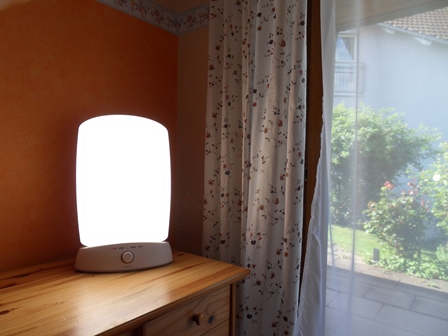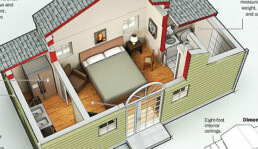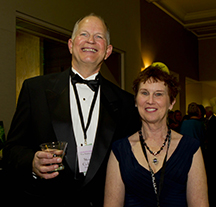Ecumen Awarded LeadingAge Innovation Grant To Test Dementia Care Light Therapy
Ecumen has been awarded a $29,800 LeadingAge Innovations Fund grant to integrate light therapy into memory care units for adults with Alzheimer’s disease and related dementias (ADRD).
An estimated 80 to 100 people with ADRD living in Ecumen memory care units will be part of the pilot program using light therapy as a way of decreasing sleep disturbances and reducing depression and agitation. In its grant proposal, which was chosen from 110 applications, Ecumen cited promising research showing exposure to bright lights and blue lights can increase daytime wakefulness and improve night sleeping among people with ADRD, who can spend 40 percent of their nights awake and a large portion of their days asleep. 
The pilot will be at three sites— Ecumen Parmly LifePointes in Chisago City, Minn., and Ecumen-managed sites Grand Village in Grand Rapids, Minn., and Heritage Living Center in Park Rapids, Minn. Training and development work on the initiative will begin in January, 2015, and the light therapy is expected to begin by April, 2015. At the three sites, blue lights will be installed in common areas and bright light tablets will be placed in residents’ rooms. In its grant application, Ecumen said: “Based upon our review of the literature, we believe two to four hours of exposure to bright or blue lights should be effective in improving sleep patterns and reducing agitation.”
The light therapy project will be incorporated into the ongoing Ecumen Awakenings™ initiative, a care program that emphasizes managing dementia without highly sedating drugs. Residents, their families, doctors and care staff all work together to replace traditional drug therapies with individualized techniques that reduce anxiety and difficult behaviors while improving quality of life. Behavioral changes already are carefully monitored and documented, and measurement of the effects of the light therapy will be incorporated into the ongoing programs.
LeadingAge, a national association of nonprofit aging services providers, awards Innovations Fund grants to nonprofit providers of aging services for projects that “have a demonstrable impact on residents, clients, families, employees or the broader community, and that have the potential for replication.”
The grant to Ecumen falls in the category of Innovative Dementia Care Programs “that pursue promising strategies for improving the quality of life and quality of care for people with dementia.” The awards are funded from LeadingAge’s Great Minds Gala (held in partnership with Integrace, formerly EMA), as well as the generosity of LeadingAge members and individuals. Earlier this year, Ecumen received national recognition as winner of the LeadingAge Excellence in Dementia Care Award recognizing extraordinary leadership in the quest to improve lives of those touched by Alzheimer’s disease and other dementias.
Join Mary Furlong, Ecumen, AARP and Others Shaping "What's Next" in Chicago March 12

Dr. Mary Furlong is one of those people who sees the future and opportunities where others see problems and challenges. It's her vision that led to the development of SeniorNet a quarter century ago, bringing foundations, Apple, IBM, the Bureau of Indian Affairs and others to bring computer access to more than a million underserved Americans.
If you want to join with Mary, Ecumen, tech trend watcher Lauri Orlov, MetLife, AARP and many others working to shape the future of aging and innovation, sign up for the 2013 What's Next Boomer Business Summit. Ecumen will be participating in a panel discussion on the future of Alzheimer's care and sharing insights from our Awakenings program to reduce the unnecessary use of antipsychotic medications in dementia care.
Ecumen receives $3 million Margaret A. Cargill Foundation grant
SHOREVIEW, Minn. (February 5, 2013) – Ecumen, a non-profit that provides senior housing and services across Minnesota and nationally, announced today it has received a $3 million grant from the Margaret A. Cargill Foundation.
The grant will help transform a longstanding nursing home at Ecumen Detroit Lakes into a one-stop aging services hub that improves and expands service access for seniors in rural Becker County, Minnesota. The goal is to develop a replicable model that maximizes existing community infrastructure, integrates technology, and combines services in one location to help seniors remain healthfully independent in rural America.
Rural America Larger Than Most Nations
If rural America were a country, its population of 50 million would be larger than nearly all of the world’s nations. Rural America’s fastest growing population cohort is people 65-plus. Seniors make up 15 percent of the country’s rural populace, with the proportion of seniors greater in rural areas than metropolitan areas. Overall, rural residents have proportionately more chronic conditions than their urban counterparts, but obtaining services that can help a person remain independent can be difficult in rural areas, especially for seniors, many of whom live alone.
“We are honored by this opportunity to carry out Margaret A. Cargill’s philanthropic vision, especially as it relates to transforming aging services and serving unmet needs,” said Kathryn Roberts, president and CEO of Ecumen. “Our goal is to help keep people healthier and out of the nursing home and hospital. This initiative will take a whole-person approach and create a community hub that helps integrate technology, socialization, fitness, nutrition and health care. Society has long looked at aging as a challenge. We believe growing older represents one of our country’s great innovation opportunities.”
Ecumen has commenced design work on the new center on the Ecumen Detroit Lakes campus, which includes a mix of housing and services for seniors. Construction is anticipated to begin in the Spring and conclude in 2014. Components will include:
- A telehealth center for physicians, nurses and other health care professionals to conduct patient consultations
- Thirty private rehabilitation suites for short-term stays, so area residents can rehabilitate after illness or surgery and then return home
- A warm-water pool for exercise classes and physical therapy.
- State-of-the art occupational therapy, speech therapy and physical therapy areas
- A fitness center with anaerobic and aerobic equipment, which can accommodate all strength levels
- A labyrinth area for meditation, prayer and reflection
- An internet café, library and classrooms for health workshops, classes and other social and educational opportunities
- A salon
- A dining area for up to 40 people
In most rural areas this mix of services doesn’t exist or is geographically scattered. A hub approach opens the door to making other community resources more accessible. For example, it can provide area physicians a partner in physical therapy, and care and patient health monitoring to better coordinate health information; transportation approaches can be focused on a single destination; and it can help better define and coordinate acute care and non-acute care services in the larger community.
Ecumen (www.ecumen.org), which is based in Shoreview, Minn., is the most innovative leader of senior housing and services, empowering people to live better, easier and more fun lives. Its mission is to create home for older adults wherever they choose to live. Ecumen envisions a world in which aging is viewed and understood in radically different ways. The Minneapolis/St. Paul Business Journal has identified Ecumen as one of Minnesota’s “Best Places to Work”, and the Minneapolis Star Tribune named Ecumen as one of Minnesota’s “Top 100 Workplaces”.
What You Can Expect From a Great Assisted Living Community
By Carol O'Dell, Caring.com contributing editor
Last updated: January 16, 2013
How will you find a good assisted living community for yourself or your loved one? A place that's affordable and safe, with excellent care, warm surroundings, and a friendly staff?
With more than 31,000 senior care facilities across the country, the good news is that there are lots of choices. The less-than-good news is that there are lots of choices! How do you begin your search? What do you look for -- and how do you know when you've found it?
Assisted living facilities have much to offer the aging population. From yoga classes to nature trails, movie nights to computer and painting classes, seniors will find something that entices them out of their apartments and into the many gathering places most facilities provide.
But it's not the indoor heated pools or fitness rooms that make for a good assisted living community -- it's when your loved one knows she belongs. It's when a staff member notices that something just isn't right and your loved one receives prompt attention. It's when other residents smile when they see her step into the dining room, or when you, the family member, know you can stop by at any time.
From coast to coast, in big cities and small towns and everything in between, there are some assisted living communities that truly shine. These are establishments that have inspired top-notch reviews from residents, experts, and families just like yours. These are the best of the best -- the Caring Stars of 2013.
Even though these providers are all over the country, it turns out that they have some important things in common. Here, we present five trends among Caring Star winners -- qualities that communities near you should have, too.
1. A clean, safe place where needs (big and small) are addressed promptly: "I feel heard."
Making sure your loved one is safe and receives prompt attention trumps the list. The best communities draw top-quality staff and keep communication open. In the words of one caregiver, they're "easy to contact and never hesitate to call if something needs to be discussed."
It's when everyone -- the director, the kitchen staff, the care aides and nurses -- goes out of their way and takes the time to do the little things that matter so much. Places where food requests are accommodated or that have “a chef who knows how to make the food sing.” Places where, as one family member said, the staff is "considerate and dependable, no matter when I call."
2. Homey touches: "It feels like home."
No one wants to feel like they're living in a hospital, and they don't have to. Assisted living communities have come a long way. They feature special touches, such as manicured grounds with flower beds, gazebos and ponds, inviting décor, and "spacious, well-maintained living spaces." Where living spaces reflect residents' personalities -- like the community where "residents had several of their personal belongings displayed, such as photographs and figurines." "Placing a loved one here will help me sleep at night," one visitor said of a two-time five-star community in his area.
3. A trustworthy staff and active residents: "It feels like family."
Trusting that your loved one is receiving good care is vital, and there's nothing like being greeted by name. These are the places where "you can feel the love when you walk in the door." It's also important that your loved one find new friendships. "Several residents stopped and talked to us. It was nice to know that my grandma wouldn't have a problem meeting people" is how one granddaughter expressed it.
4. Great amenities: "I feel like I'm on vacation."
You're in for treat when it comes to amenities. Assisted living communities now offer video, audio, and book libraries; computer rooms; and classes on everything from digital photography to scrapbooking. If you're into fitness, you can swim, golf, and even take a "laughing yoga" class. And don't think you're stuck in one place: After visiting a friend at her community, one reader said, "We walked the trails that lead to the park in the back. We ate lunch in the dining area (food was great) . . . then took the facility bus ride half a mile down to the mall for shopping."
You're likely to find whatever you're interested in, whether it's church services; game nights; a 24-hour café offering beverages and light snacks; or easy access to nearby shopping, museums, music venues, and restaurants.
5. Family-friendly atmosphere: "I feel like my family and friends are always welcome."
It's tough to place your loved one in a care community, so finding one that's family-friendly helps assure you that your loved one will stay connected. "Family involvement is encouraged, and there are special family nights several times during the year, with live music, festive decorations, and a beautiful buffet," one family member said of her experience with a loved one's assisted living community. Life is sweeter when you're able to invite a friend for lunch, and when your grandchildren and even the great-grands get to visit often. Some assisted living facilities send out invitations to special events and celebrations; you can even reserve a room for birthdays and other important gatherings.
Before choosing an assisted living community, gather as much information as you can. Be sure to go online and see if there are Caring Stars in your area, and read reviews for other communities as well. Then schedule a few tours of your top selections. Print out a copy of the Caring Checklist for evaluating assisted living providers so you can make notes as you go.
While you're there, talk to the staff (include a chat with someone from the kitchen staff, care aides, the activities director, and others) and be sure to meet a few residents and their visitors. Ask for a chance to enjoy a meal in the dining hall.
And, above all else, don't hesitate to ask each community: "How many of these Caring Stars trends are you getting right?"
‘Granny Pods’ and Lennar NEXTGEN Homes – Are They What's Next?
America’s Age Wave is leading to new backyard cottages dubbed ‘Granny Pods’ (can't stand the name)(pictured top left) and “homes within a home” via Lennar’s NextGen Housing (above right). Will they take off? Learn more and share your thoughts on at this Minneapolis Star Tribune blog post.
Baby Boomers' Last Wishes: Motorcycle Hearses And Facebook Obits
by Peter Gray
January 04, 2013 5:58 PM
All Things Considered LISTEN
Lew Bird says that before passing away, his friend requested that his funeral include one last ride on a motorcycle. Enlarge image
Lew Bird says that before passing away, his friend requested that his funeral include one last ride on a motorcycle.
Peter Gray for NPR
Old Aristocracy Hill isn't a part of Springfield, Ill., that draws a lot of attention. The quiet neighborhood dates back to before the Civil War, its historic homes now carefully preserved by proud business owners.
But outside a stately funeral home, a large black-and-chrome Harley Davidson motorcycle trike pulls out of the parking lot, towing a matching casket in its glass-sided trailer.
It's not something you would expect to see, but it's exactly what 67-year-old Lew Bird says his friend Dave Rondelli wanted: one last ride.
"Our generation, the baby boomers, have really taken to motorcycles. We're retiring, and we can afford to do that kind of thing," Bird says. "He loved it. He retired, and he rode his bike a lot. You know, guess if you're going to go out, go out the way you like to go."
Chris Butler, director of Butler Funeral Home, says he bought the motorcycle funeral coach because his customers are increasingly seeking a highly personal and unique experience. Funeral customs and rituals, he adds, tend to evolve with time and reflect the culture in which they're practiced.
"Today people are wanting very much [for] their ceremonies to reflect their life, the meaning of their life," Butler explains. "So we can offer families the traditional as well as unique options for remembering their loved one."
He also says posting an obituary on his company's Facebook page is another option to get funeral information out to the community quickly. But not everyone in the business agrees it's a good idea.
Randall Earl, former president of The National Funeral Directors Association, which tracks trends in the industry, has been in the business for 40 years and holds concerns about some of the innovations, including utilizing social media in the funeral planning and grieving process.
Dave Douglas' new album, Be Still, includes hymns he played at his mother's funeral service.
Music Interviews
Dave Douglas: Jazz Hymns Honor A Dying Wish
Adele singing Someone Like You at the 2011 MTV Video Music Awards in Los Angeles. That's one way to say goodbye.
The Two-Way
'My Way,' OK; But Singing 'Someone Like You' At A Funeral? Isn't That Wrong?
"It can be very harmful if you have family members who are angry with other family members and they have a death," Earl says.
He maintains that it's just too difficult to control what's said and done by mourners on social media platforms.
"I would say we're just trying to protect our business as well as the families we serve, and I do not have a Twitter or Facebook for those reasons," Earl explains.
Others, like Greg Young, argue that protecting families and social media don't have to be mutually exclusive. The 32-year-old entrepreneur, who left his job at IBM five years ago to launch funeralinnovations.com, maintains that careful use of social media can vastly improve a memorial experience, while upholding an appropriate level of privacy.
"Every funeral home needs to have their own strategy; there's no cookie-cutter approach," Young says. "There may be some times that you do not want to post the obituary, and we do have those cases that we work with."
Young's company sells Web, mobile and social media marketing, and believes that, like so many other things, the future of funeral planning will rely on tablets and smartphones. As families scatter across the globe, he says that often the best way for his clients to connect with mourners may well indeed be online.
"We're really starting to push webcasting, which has been out there for years, but funeral homes typically have not accepted it," Young explains. "We think it's very important to preserve that moment, so that generations to come can easily come back and access that information and learn more about their ancestors."
All of the recent innovations — webcasting for genealogy, Facebook pages for grieving families, mobile devices to plan a funeral or find an obituary, even a motorcycle hearse — may or may not stand the test of time.
But what's clear is that whatever changes endure will likely be those sought by baby boomers, who continue to drive consumer trends in life and in death.
Vital Aging Network Forum: Be Your Own Healthcare Advocate
Be Your Own Healthcare Advocate. Getting what you need to make good decisions
America's Disjointed Care System - There's a Better Way
Our country spends trillions on disjointed, poorly coordinated care, especially for older Americans. The unneccesary bouncebacks that occur between the hospital and a person's home take a lot out of a person and their families. Imagine if physicians and consumers and caregivers could talk with each other and easily share information, instead of wasting time, putting people through unpleasant hospital stays, weakening them further and spending tons of money that could be used in a much better way for the health of Americans. This new video by LeadingAge depicts what that future could look like. This issue is solveable by combining high tech and high touch approaches as seen here.
Nonprofit marks 150 years, but last 10 a doozy
Kathryn Roberts, president & CEO, and Steve Ordahl, senior vice president of business development, celebrated Ecumen’s 150th anniversary at a gala last month.
A Personal Emergency Response System Designed by You
 A PERS (Personal Emergency Response System) device empowers older adults with security and independence, honoring their desire to live in their own homes. A group of PERS device companies are looking for your input to design the next generation of this product. If you are 55 or older, we would be grateful if you would take their three-minute survey. Your confidential responses will help these companies gain greater insight on what consumers want in a PERS device.
A PERS (Personal Emergency Response System) device empowers older adults with security and independence, honoring their desire to live in their own homes. A group of PERS device companies are looking for your input to design the next generation of this product. If you are 55 or older, we would be grateful if you would take their three-minute survey. Your confidential responses will help these companies gain greater insight on what consumers want in a PERS device.
At Ecumen, our promise to innovate, empower and honor is also an expectation of our partners and the products they bring to our customers and communities. Help us shape the future of this product, and help people who want to remain living in their own homes. We thank you in advance for taking the time to complete the survey.
https://www.surveymonkey.com/s/LinkAge2012




